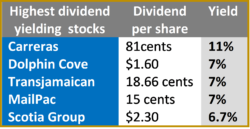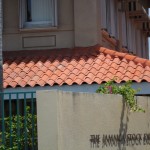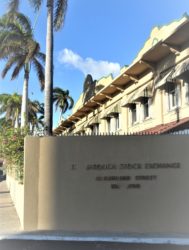Rates ended mixed on the latest issues of Government of Jamaica Treasury bills issued on Friday, June 9, following the auction of the two issues on Wednesday for $1.4 billion.
 The 91 days issue for $700 million that matures in September this year resulted in an average yield of 7.86327 percent and the 182 days instrument has an average yield of 7.88671 percent.
The 91 days issue for $700 million that matures in September this year resulted in an average yield of 7.86327 percent and the 182 days instrument has an average yield of 7.88671 percent.
The yield on the 182 days instrument is the lowest since August 2022 when it averaged 7.86, while the 91 days T-bill inched up from 7.82 percent in May but matched the rate in November last year and came against a background when the previous Bank of Jamaica CD average rate jumped to 9.30 percent, with only $21.36 billion going after the $22 billion the central bank offered.
The amounts of Treasury Bills applied for was $2.3 billion for the shorter term instrument and $3.06 billion for the other.
Mixed interest rate movements
April T-Bill cacelled as GOJ cash surges
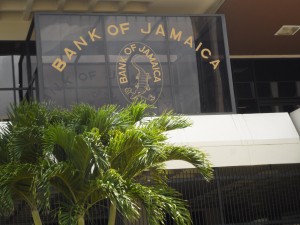 Regular issue of Treasury bills would normally be held by the 19th of April but none were offered this time around based on the absence of an announcement by the Central Bank of Jamaica.
Regular issue of Treasury bills would normally be held by the 19th of April but none were offered this time around based on the absence of an announcement by the Central Bank of Jamaica.
When the last issue of Treasury bill closed on Friday, 15 March 2017, the Bank of Jamaica stated that applications for the next offer of Government of Jamaica Treasury Bills must be lodged at the Bank of Jamaica by 10:45 a.m. on Wednesday, 19 April 2017. Bank of Jamaica acting on behalf of the government would make an announcement of the date and amounts for the upcoming issue. The website of Bank of Jamaica carries information when the public is being offered news bills and the result of the issue, a check on the site throws no information on the April issue, with no announcement no explanation for cancelation of the issue.
At the end of February, data out of the Ministry of Finance showed a budgetary surplus of $17.5 billion in revenues above forecast and a cash deficit of $5.5 billion. With March projected to generate large net inflows of revenues over outflows, the central government would not need to borrow from the financial market. Inflows was projected at $72 billion and expenditure at $35 billion for March, if achieved would result in a surplus of $30 billion for the financial year.
Calculating Treasury Bill interest income
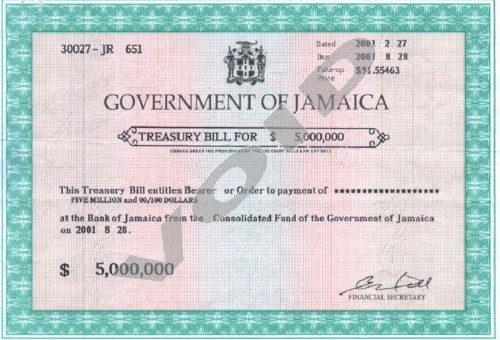 New issues of Treasury Bills are offered on a regular basis by governments all over the world, to fund their short term financial obligations, but not everyone knows how the income payable on them are computed. Unlike regular bonds where the rate of interest to be paid is stated on the face of the instrument, that is not the case with treasury bills. .
New issues of Treasury Bills are offered on a regular basis by governments all over the world, to fund their short term financial obligations, but not everyone knows how the income payable on them are computed. Unlike regular bonds where the rate of interest to be paid is stated on the face of the instrument, that is not the case with treasury bills. .
The bills are usually of 30 days, 90 days, 182 days and 365-days duration but may vary by a day or two in each case. The rate of interest paid on these instruments is determined by an auction system. At these auctions investors predetermine what rate of interest they want and made an offer in writing ahead of the closing time prior to the bids being opened. The lowest rates are satisfied first. If the amount offered for sale by the government is oversubscribed, then those with rates that are higher than the rates on those amounts that equate to the amount offered, are rejected.
These bills are sold at a discount below the face value that the holder receives at maturity and requires the buyers to quote their bids lower than the maturing amount. For example one may bid at a price of $97 per $100 of 91 days Treasury Bills giving a discount of 3 percent. The discount rate is the difference between the lower price paid for a security and the security’s face value, adjusted for the maturity of the issue. It is calculated as follows:
((face value-purchase price)/face value) x (365/term) x 100 = discount rate. Using this example the discount rate for an instrument of 91 days will be computed as follows: ((100-97)/100) x (365/91) x 100 = 12.03%. ((face value-purchase price)/purchase price) x (365/term) x 100 = yield. The annualized yield, or the actual rate of return per year, is calculated as follows: ((100-97)/97) x (365/91) x 100 = 12.41%.
The amount of treasury bills offered, are published by the central banks who act on behalf of the governments and may be purchased either directly by investors or through brokers. There are usually set dates each month for these issues. Information published for each tender are those relating to the dates of issue, maturity, the closing and settlement.
Interest rate rise & fall
Interest rates on the latest issues of treasury bills by the Government of Jamaica on the 15th and 24th of January 2014 to provide funding for $1.2 billion showed mixed results.
Three offerings were available of $400 million each for duration of 28 days, 91 and 182 days. The rate on the 91 day instrument resulted in an average rate of 7.4292 percent a slight decline compared with the last issue of same duration, the rate for the 182 day instrument came out at 8.71734 percent reflecting a rise over the 8.25335 percent that obtained at the December 2013 auction, the 91 day issue resulted in an average rate of 7.5338 percent.
 Investors received rates as high as 7.77998 percent for the 30 day T-Bill and as high as 10 percent for the longer dated instrument. Just over 11 percent of investors’ funds benefited from the higher yield for the 90 day paper buy. It was as high as 6.969 percent for the short term T Bills.
Investors received rates as high as 7.77998 percent for the 30 day T-Bill and as high as 10 percent for the longer dated instrument. Just over 11 percent of investors’ funds benefited from the higher yield for the 90 day paper buy. It was as high as 6.969 percent for the short term T Bills.
On January 15, an issue of a 28 day Treasury bill resulted in an average rate of 6.12 percent similar to the issue in December 2013 with a 6.12 percent average rate for the 28 day offer maturing in January and continues to compare favourably with the 6.2522 percent that obtained at the offer in November.
Related Posts | Interest rate eases
Interest rate eases
Rates on the most recent Treasury Bills fell in the latest offering by the Government of Jamaica.
The rate for the January Treasury bill came out at 6.12 percent compared to 6.2522 percent in December. Investors on Wednesday, 15 January, applied to purchase $400 million 30 days Government of Jamaica Treasury Bills dated Friday, 17 January 2014. This resulted in the average yield of 6.11877 percent. However, yield went as high as 6.29577 percent. A total of $567,065,100 was submitted by applicants in their bid to obtain the instruments.
Related post | T-bill rates mixed at auction
T-bill rates mixed at auction
Interest on Treasury bills rose again in the latest auction held on 21 August 2013. On offer were two instruments seeking to raise $400,000 each for 91 Days and the other of 185 Days duration. Both instruments were oversubscribed.
The average rates came out at 7.34, down from 7.995 percent for the 91 day at the July auction and is back at the level in June. This is a pretty sharp decline, as $771.75 million chased $400 million on offer. But investors who placed bids as high as 7.75 percent were able to get some of their bids filled. Full allotment took place at 7.74923 percent.
The 185 Days instrument came out at an average rate of 8.1255 percent, slightly up from the 182 days instrument issued in late July at 7.88 percent. Investors, however, got rates ranging from 6.729 to 8.50 percent in full and partial allotment as high as 8.657 98 percent. A total of $400 million were on offer and bids amounting $768 million were tendered.
Related posts | T-bill rates move up again
BOJ offers 3 new CDs
Bank of Jamaica will be offering three variable rate instruments commencing Friday, 26 July 2013 to Friday, 02 August 2013 as a continuation of open market operations. The announcement again comes at a time when it appears that authorised dealers are holding back on selling the foreign currency into the system as is evident for the past four days.
The instruments on offer are:
- A 186-day Certificate of Deposit, for an unlimited amount. The instrument re-prices quarterly at 0.15 percentage point above the three month GOJ Treasury Bill rate existing at the start of each re-pricing period. The initial coupon for the first three months is 7.50 per cent per annum.
- A 276-day Certificate of Deposit, for an unlimited amount. The instrument re-prices quarterly at 0.20 percentage point above the three month GOJ Treasury Bill rate existing at the start of each re-pricing period. The initial coupon for the first three months is 7.55 per cent per annum.
- An 18-month Certificate of Deposit, for an unlimited amount. The instrument re-prices quarterly at 0.25 percentage point above the three month GOJ Treasury Bill rate existing at the start of each re-pricing period. The initial coupon for the first three months is 7.60 per cent per annum.
 At the March auction, for T-bill, rates moved up from 1.337 percent in February to 1.85 percent in March for the shorter-term treasury rate and from 1.387 percent for the 192 days to 1.796 percent. The rates are coming from a low of 1.252 percent and 1.453 percent, respectively in January this year.
At the March auction, for T-bill, rates moved up from 1.337 percent in February to 1.85 percent in March for the shorter-term treasury rate and from 1.387 percent for the 192 days to 1.796 percent. The rates are coming from a low of 1.252 percent and 1.453 percent, respectively in January this year.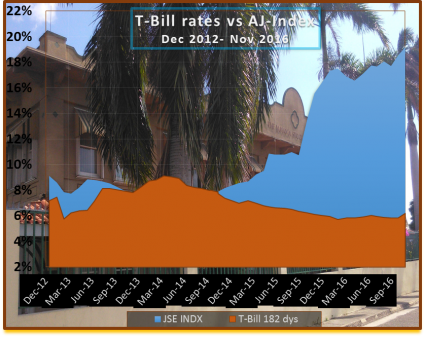 The latest issue of Treasury bill offerings saw the 182 instrument climbing 40 basis points to 6.2 percent while the 91 days T-bill rose marginally to virtually hold at 5.70 percent just a tad above the average in October.
The latest issue of Treasury bill offerings saw the 182 instrument climbing 40 basis points to 6.2 percent while the 91 days T-bill rose marginally to virtually hold at 5.70 percent just a tad above the average in October.



